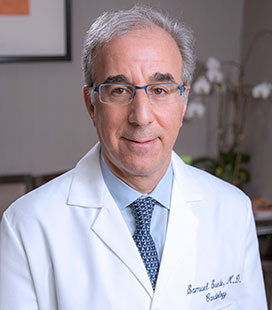
Samuel Suede, MD, chief of cardiology
Cardiovascular disease is currently the leading cause of death worldwide. However, there are steps we can take to reduce our chances of developing this serious condition. According to the American Heart Association, 80 percent of heart disease and stroke events may be preventable through education, lifestyle changes, and risk-factor modification.
For those looking to get serious about heart health, but not sure where to start, what simple lifestyle changes would you recommend?
One of the easiest and most important changes people can make is diet modification. Here are a few “dos and don’ts” to remember.
- Do eat the rainbow. Aim to include a wider variety of “color” in your foods.
- Consume unprocessed healthy foods rich in nutrients and vitamins, such as green leafy vegetables, fresh berries and fruits, fish, lean meats, and whole grains.
- Do stop the salt. You don’t have to cut it out all at once, but reduce the amount you use with each meal, and work toward preparing foods with little or no salt.
- Don’t regularly indulge in sweets. Read labels and minimize the amount of sugar you consume in beverages and prepared foods. Opt for Valentine’s Day flowers over jumbo heart-shaped boxes of chocolate.
Diet aside, what habits can people change to be heart-smart?
There’s still time to stick to those New Year’s resolutions. It’s important to maintain a healthy weight, not only to care for your heart, but also for your overall well-being. Make sure you’re not sitting still all day—move more! Build exercise into your weekly schedule so it becomes a habit. Aim for at least 30 minutes of moderate-intensity aerobic activity, five days a week. If you have a job that keeps you deskbound, take breaks to stretch and go for a walk. It’s also the perfect time to quit smoking. Even casual smoking can do a lot of damage—so don’t start if you haven’t already! And limit your alcohol intake to one drink per day. If you do overindulge, don’t be too hard on yourself and don’t give up. Each new day counts when it comes to heart health.
How does stress affect the heart, and how can we better manage it?
Stress and anxiety affect the entire body in a number of ways. Stress itself can cause and aggravate hypertension. It can also lead to unhealthy coping mechanisms such as smoking, excessive drinking, overeating, and physical inactivity, causing high blood pressure and cholesterol—both of which increase the risk of heart disease. So the most important advice I can give is to relax more. Learn healthy ways to cope with stress—a hobby, a new exercise routine, time with family and friends. The Graf Center for Integrative Medicine at Englewood Health offers yoga, guided meditation, massage, acupuncture, aromatherapy, Reiki, nutritional counseling, and various other services to help relax the mind and body.
What are the key takeaways, and how can we track our progress?
This year, focus on you.
- Manage and prevent high blood pressure, high cholesterol, obesity, and diabetes through proper nutrition, exercise, medication (if necessary), and regular follow-up visits with your physician.
- Come prepared to discuss your family history, which can influence your risk factors for heart disease.
- Know your numbers. What are your blood pressure, cholesterol, and glucose levels? Ask for printouts of your lab work or make use of your physician network’s online portal. Taking steps to reduce these levels if elevated can significantly decrease your risk of developing heart disease.
- Take note of your activity and behavior changes between visits, as well as any resultant changes in your levels.
- Most important, don’t ignore the warning signs. If you develop new chest discomfort or experience difficulty breathing, palpitations, lightheadedness, or are feeling faint, be sure to reach out to your doctor immediately, as these could be symptoms of heart disease.
Posted September 2018; Updated January 2023
